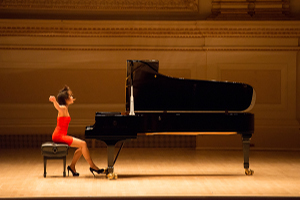
Yuja Wang is known for her pyrotechnics on the keyboard and, to a much lesser degree, for the flashy dresses she wears when she performs. On Tuesday night at Walt Disney Concert Hall, the dresses were there, but the pyrotechnics were subdued, sort of. In fact, Wang gave a decidedly un-Yuja-like recital.
To begin with, the program was modified slightly, with the change listed on an insert in the program book. But before she came out on stage, she surprised the audience by taking to the microphone to announce that she was going to play the pieces out of order according to how she was feeling at the moment. For this recital, Wang chose 11 miniatures (the longest was 11 minutes) from seven composers (not including the three encores).
A couple of minutes after her announcement, Wang walked on stage in a full-length sparkling gold gown that, not surprisingly, was very tight fitting. She began, not with a blockbuster showpiece, but with a rather obscure piece, the Andante from the sonata No. 5 in C major by Venetian composer Baldasare Galuppi. The Andante is a five-minute Scarlatti-like gem that really set the stage for Wang’s contemplative and introspective recital.
She followed that with another rarely heard piece, “Une barque sur l’océan” from Mirrors by Ravel, an impressionistic masterpiece that, as its name (“a boat on the ocean”) suggests, gives the impression of a boat casting about on the waves in the middle of the ocean. Wang’s fingers were quick and light on the keys as the sparkles from her dress reflected lights dancing on the stage behind her.
Wang next performed three of the longest pieces, the rarely heard Piano Sonata Op. 1 by Alban Berg (at 11 minutes), the Bach toccata in C minor, BWV, 911 (at almost 10 minutes) and
the sonata No. 4, Op. 30 by Alexander Scriabin (at seven minutes). These three pieces couldn’t be more different, and yet they fit into the overall feeling of the evening that Wang wanted to convey. Each piece, in its own way, vacillates between quiet reflection and stormy expression, and Wang not only demonstrated the fiery playing she is known for, but also, and more important for her goal of this recital, the impeccable technique to capture the gentlest and most personal moments.
After only 38 minutes, the first half was over, taking the audience by surprise again.
After changing into a much shorter, white dress, Wang appeared on stage for the second half, much of which was devoted to pieces by Chopin and Brahms — two Intermezzos and a Romance by Brahms and two Mazurkas by Chopin. All of these pieces, but especially the Brahms, are relatively subdued and lyrical, and Wang weaved them into a fabric that seemed as if they were meant to be played together. It was really a sublime 22 minutes of music. Wang and Brahms? Who would have thought it? And yet, her technical and musical skills produced a really blissful experience.
Wang closed out the first half with the Piano Sonata No. 5, Op. 53 by Scriabin. There is a lot of mystery surrounding Scriabin, mostly created by Scriabin himself, and one could try to find some kind of enigmatic meaning in his compositions. Or one can simply feel the music and play it superbly as Wang did on Tuesday night.
After Wang exited the stage, the lights remained down for minutes while the audience continued to clap, not sure whether she would return for an encore (she usually plays several). But then, just when the audience was tiring, she returned to cheers. For those expecting some pianistic fireworks, however, she surprised again with an obscure piece originally scheduled to be part of the program, the “Secreto” from Impressiones íntimas by an 18-year-old Spanish composer Federico Mompou, who lived from 1893 until 1987. If it sounded like Erik Satie, it’s because Mompou was influenced by him as well as by Fauré. It was a low-key encore in line with most of the rest of the program.
However, the Wang everyone was expecting emerged for the second encore with the Toccata, Op. 11 by Prokofiev, which she played thunderously. For her last encore, Wang returned to the more introspective with a performance of the song “Gretchen am Spinnrade” (Gretchen at the spinning wheel), Op. 2, D. 118 by Schubert, as arranged by Liszt. It is a favorite of hers (she played it at the Verbier Festival in 2014) probably because it gives her a chance to demonstrate her deep musical understanding with the thrill of Lisztian pianistic prowess.
Wang felt these pieces in the exact order in which she played them, and masterfully conveyed not only her feelings about them, but the beauty in the music.
Interestingly, if coincidentally, the French pianist Hélène Grimaud will give a recital next week on Wednesday, Feb. 26 with a first half that, like Wang’s recital, is comprised of 13 miniatures by the likes of Debussy, Satie and Chopin.
—Henry Schlinger, Culture Spot LA
For information about upcoming concerts, visit www.laphil.com.





